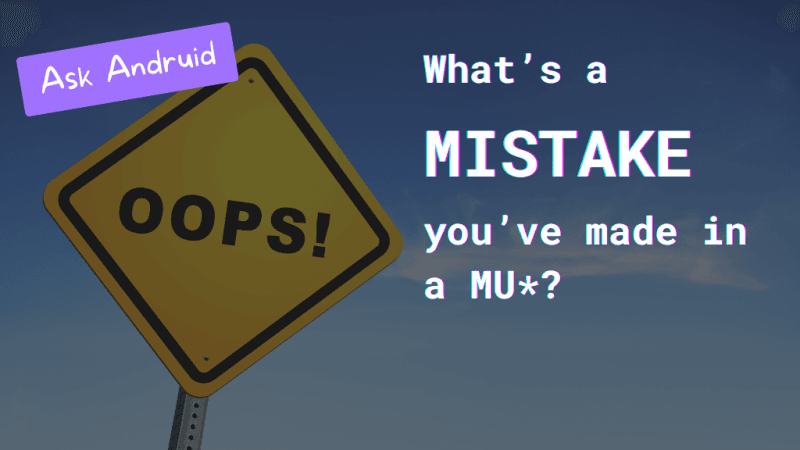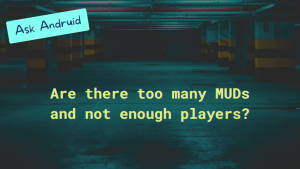Dear Andruid,
What is a mistake you’ve made on a MUD/MOO/MUSH, and how did you deal with it? I haven’t been playing these kinds of games for very long, and I am still learning a lot.
– Curious Player
Thoughts on a poignant gaming mistake
Dear Curious Player,
A mistake? Hmm… When I started the Ask Andruid series, I wasn’t thinking about this kind of question, but I’m glad you asked!
I’ve made pleeeenty of mistakes over the years. If describing one of them can help readers avoid similar blunders, I’d be happy to!
Perhaps my goofiest (yet still instructive) mistake in recent memory was an automapper incident that happened on The Free Zone. The Free Zone was a roleplaying-focused post-apocalyptic zombie MU* featuring PvE hazards and permanent death.
While joined with a large group of PCs exploring a high-risk area, I tried to adjust the position of a room on my map and accidentally triggered the mapper’s speedwalk function.
Suddenly and inexplicably, my combat-averse field medic character marched past her group and straight into the next room, which was brimming with deadly, deadly zombies, lol.
She died almost instantly, leaving her companions stunned and confused.
Oops! 😂
When this happened, I’d been playing the game for several months already, which meant that losing my character over this oopsie meant losing a fair chunk of progress and time invested. Not the end of the world, but definitely facepalm-worthy.
So the first lesson I learned from the experience was: don’t futz around with your automapper in dangerous places! (And if you need to, make sure to disable speedwalk, first!)
But the more important thing that occurred to me sometime later was: I’m sure glad I had a bunch of witnesses!
Because in hindsight, having a room full of witnesses made it really easy to ask a staffer to restore my character on the spot.
(Fortunately, this was a game where I felt comfortable asking.)
Up until that final gory moment, I’d been actively roleplaying a doctor-spec character who very much wanted to stay alive for as long as possible, so to any one of those other players, it would have seemed utterly bizarre that she suddenly decided to become volunteer zombie food.
This makes an automapper goof-up sound much more likely, doesn’t it?
But imagine if my character had been exploring in a dangerous area alone when she died.
In that case, staff would have nothing to go on other than my word as a player that an “automapper accident” occurred.
And that’s where player reputation comes into play.
When and why player reputation matters
If you’re an honest player who maintains a good reputation, staff won’t have to deliberate so hard when something stupid happens. They’ll be able to take you at your word and enjoy peace of mind about it after.
Instead of helping you out of a dubious circumstance, they’ll be helping you recover from a genuine, if embarrassing, PEBKAC moment.
Now imagine how much harder the same decision would be for a staffer who wants to do a good thing but is dealing with a player with a less-than-stellar reputation.
For example: a player who has been caught altering logs, skirting the rules, undermining the spirit of the game, or taking advantage of bugs instead of reporting them.
Putting myself in the staffer’s shoes, the decision now seems so much more… tiring.
What if I choose NOT to restore the character? If it’s a difficult or problem player, I can expect some kind of fallout, maybe even a heated argument. They may push that it REALLY WAS an accident and insist that I’m being unfair. If they’ve only been a problem player in the past or on a few occasions, I might even start to doubt my decision and sympathize with them…
But what if I choose to grant a restore to this player who has been known to lie, cheat, or manipulate? Then I’ll be left wondering whether I just let someone take advantage of me. Did I just give a dishonest player a reason to keep being dishonest? Did I set a poor precedent? Where do I draw the line?
Depending on the game’s policies, we could take this down a few more rabbit holes, but the point is: there’s no good choice here.
When dealing with dishonest players, both options suck, and they’re both mentally and/or emotionally taxing. Maybe not so much by themselves in isolation, but when things like this happen repeatedly, it’s no surprise that staff eventually become burnt out.
Maintaining a good player reputation can help your favorite game
Ultimately, the unexpected lesson I took away from my automapper blunder is this:
Playing MU* games in an honest way reduces strain on staff and benefits me as a player.
It makes for a healthier game, healthier community, and healthier people. It makes for easier decisions, less record-keeping, and greater peace of mind.
I wouldn’t have thought that this one mapper mishap would make me consider the value of a good player reputation, but it did.
On the surface, a good player rep seems like common sense — just like maintaining an honest rep as a staffer.
But anyone who’s played an RP MU* knows that trust between players and staff can be a difficult thing. We’re all human, after all. We make mistakes.
I’m reminded here of a quote by Jumpscare:

Trust, like communication, is a two-way street, and people don’t log into the game in blank slate state. Rather, they bring with them all their experiences, good and bad, from previous games they’ve played or managed.
So if you want well-meaning staff to trust you, be a trustworthy player. Be patient. Be gracious. Respect other people’s time and energy; don’t act entitled to it.
And if you’re a staffer who wants players to trust you, be a trustworthy staffer. Be patient. Be gracious. Don’t take your frustrations with bad apples out on the good ones.
This won’t fix everything, and no one will get it right 100% of the time. But from where I sit, it seems like an effort worth making.
– Andruid






Leave a Comment